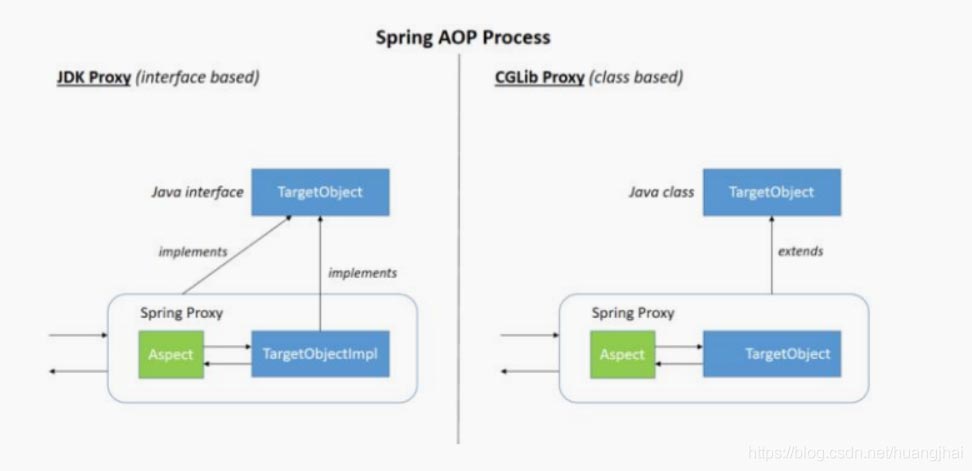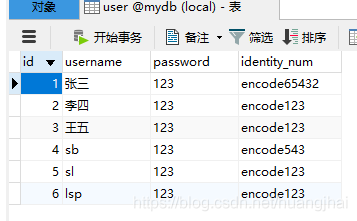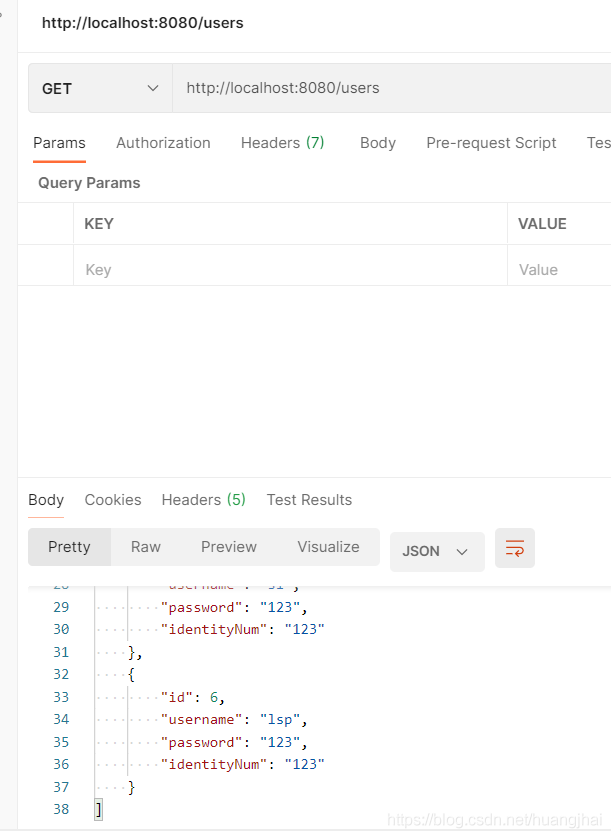使用Spring Boot AOP處理方法的入參和返回值
IOC和AOP是Spring 中最重要的兩個模塊。這里練習一下如何使用Spring Boot AOP處理方法的入參和返回值。
Spring AOP的簡單介紹:AOP(Aspect-Oriented Programming)面向切面編程,通過預編譯方式和運行期動態代理實現程序功能的統一維護的一種技術。AOP能夠將那些與業務⽆關,卻為業務模塊所共同調⽤的邏輯或責任(例如事務處理、⽇志管理、權限控制等)封裝起來,便于減少系統的重復代碼,降低模塊間的耦合度,并有利于提高系統的可拓展性和可維護性。
Spring AOP就是基于動態代理的,如果要代理的對象,實現了某個接⼝,那么Spring AOP會使⽤JDK代理,去創建代理對象,⽽對于沒有實現接⼝的對象,就⽆法使⽤ JDK代理去進⾏代理了,這時候Spring AOP會使⽤Cglib ,這時候Spring AOP會使⽤ Cglib代理 ⽣成⼀個被代理對象的⼦類來作為代理,如下圖所示:

一篇詳細介紹AOP的文章:細說Spring——AOP詳解(AOP概覽)
1. 需求場景前段時間實習,遇到了一個需求是這樣的:項目上線前,項目經理要求有一個用戶私密信息的字段需要在數據庫中加密存儲,從數據庫讀取出來后需要解密,正常顯示到用戶界面中。
下面的DEMO中,模擬場景項目經理突然覺得這個用戶的身份證號是用戶隱私需要進行加密保存,保護用戶的隱私,
User類定義如下:public class User { private Integer id; private String username; private String password; private String identityNum; //省略getter、setter、toString方法}2. 解決方案
因為是臨時加的需求,考慮到多個實體類中都會有identityNum屬性,為了不侵入原本的業務代碼和數據處理代碼和業務代碼的解耦,一個比較好的方案是使用Spring AOP處理,以DAO層方法做切點,處理字段的加密解密。
3. 代碼實現下面使用Spring Boot+MyBatis實現DEMO,模擬上述場景和解決方案實現。
Controller層UserController類的代碼:@RestController@RequestMapping('/users')public class UserController { @Autowired UserService userService; @GetMapping public List<User> getAllUsers(){return userService.getAllUsers(); } @PostMapping public void save(@RequestBody User user){userService.save(user); }}Service層UserService類代碼:
@Servicepublic class UserService { @Autowired UserDao userDao; public List<User> getAllUsers() {return userDao.getAllUsers(); } public void save(User user) {userDao.save(user); }}Dao層UserDao接口實現:
@Mapperpublic interface UserDao { List<User> getAllUsers(); void save(@Param('user') User user);}UserMapper.xml文件實現:
<?xml version='1.0' encoding='UTF-8'?><!DOCTYPE mapper PUBLIC '-//mybatis.org//DTD Mapper 3.0//EN' 'http://mybatis.org/dtd/mybatis-3-mapper.dtd'><mapper namespace='top.javahai.springbootdemo.dao.UserDao'> <insert id='save'>insert into user values (#{user.id},#{user.username},#{user.password},#{user.identityNum}) </insert> <select resultType='top.javahai.springbootdemo.entity.User'>select id,username,password,identity_num as identityNum from user </select></mapper>
切面類UserInfoHandler實現如下,這里只是使用字符串截取的方法模擬加密代碼
使用環繞通知@Around注解實現@Aspect@Componentpublic class UserInfoHandler { @Pointcut('execution(* top.javahai.springbootdemo.dao.UserDao.*(..))') public void pointcut(){ } @Around('pointcut()') public Object logAround(ProceedingJoinPoint joinPoint) throws Throwable {//處理方法參數,如果是User就進行加密處理Object[] args = joinPoint.getArgs();for (Object arg : args) { if (arg instanceof List){if (((List) arg).get(0) instanceof User){ ((List<User>) arg).forEach(user->{user.setIdentityNum('encode'+user.getIdentityNum()); });} } if (arg instanceof User){String identityNum = ((User) arg).getIdentityNum();((User) arg).setIdentityNum('encode'+identityNum); }}//執行方法,獲取返回值Object obj = joinPoint.proceed();//處理方法返回值if (obj instanceof List){ if (!((List) obj).isEmpty()){if (((List) obj).get(0) instanceof User){ ((List<User>) obj).forEach(data->{data.setIdentityNum(data.getIdentityNum().substring(6)); });} }}return obj; }}
如果是在其他實體類中也存在identityNum身份證字段,則需要在@PointCut中定義多個切點,另外處理的地方需要添加多個判斷。
定義多個切點:@Pointcut('execution(* top.javahai.springbootdemo.dao.UserDao.*(..)) ||' + 'execution(* top.javahai.springbootdemo.dao.ResumeDao.*(..))') public void pointcut(){}4. 測試
通過http://localhost:8080/users接口,將保存一個新的用戶數據到數據庫中



從測試結果可以看到代碼可以正確的處理方法的入參和返回值。
以上為個人經驗,希望能給大家一個參考,也希望大家多多支持好吧啦網。
相關文章:
1. Python使用oslo.vmware管理ESXI虛擬機的示例參考2. Jsp servlet驗證碼工具類分享3. .NET6打包部署到Windows Service的全過程4. python GUI庫圖形界面開發之PyQt5滑塊條控件QSlider詳細使用方法與實例5. IntelliJ IDEA 好用插件之analyze inspect code詳解6. JetBrains IntelliJ IDEA 配置優化技巧7. idea2020.1無法自動加載maven依賴的jar包問題及解決方法8. PHP程序員簡單的開展服務治理架構操作詳解(一)9. vue項目中使用bpmn為節點添加顏色的方法10. 解決idea update project 更新選項消失的問題

 網公網安備
網公網安備